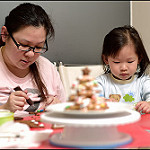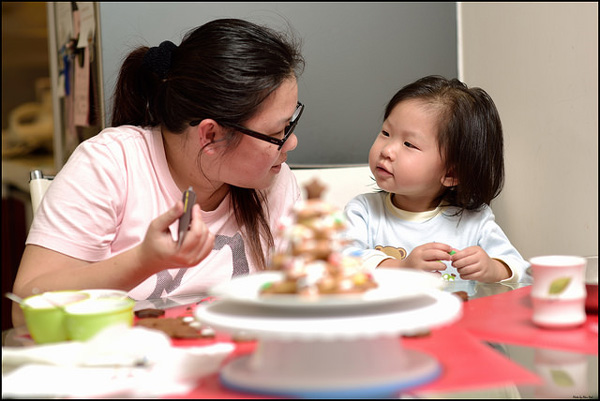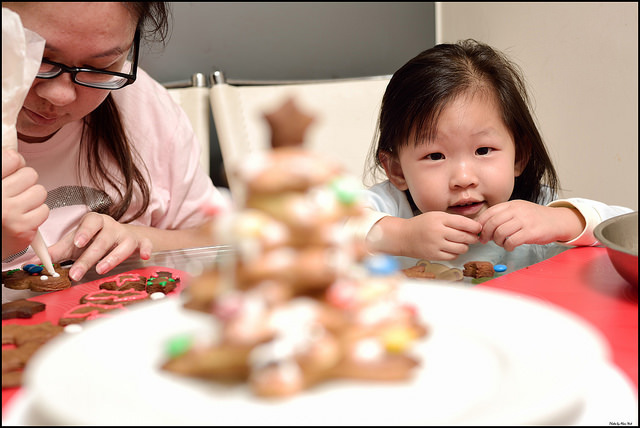10 Ways to Involve Children in Cooking
[caption id="attachment_1511" align="alignright" width="200"] Cooking with your children is a great way to bond and socialise with them[/caption] By Adam Maidment, a guest contributor from premium kitchen appliance provider Britannia Living. Cooking together as a family can be one of the best ways for you to bond and socialise with your children, and it can also be useful in teaching important developmental skills. A study by City University London found that the best way to get children to eat healthier food was to get them involved in the cooking process. Cooking can let little ones have a sense of ownership, so by letting them prepare and cook their own dishes, they may feel much more inclined to take a bite into their very own creations than if someone else was to make it for them. When recipes are complex or involve using appliances that can get hot, parents can be fearful of letting their children help out. Fear not, as we’ve found ten ways that are perfect for little hands and can get them to join you in the kitchen!
Cooking with your children is a great way to bond and socialise with them[/caption] By Adam Maidment, a guest contributor from premium kitchen appliance provider Britannia Living. Cooking together as a family can be one of the best ways for you to bond and socialise with your children, and it can also be useful in teaching important developmental skills. A study by City University London found that the best way to get children to eat healthier food was to get them involved in the cooking process. Cooking can let little ones have a sense of ownership, so by letting them prepare and cook their own dishes, they may feel much more inclined to take a bite into their very own creations than if someone else was to make it for them. When recipes are complex or involve using appliances that can get hot, parents can be fearful of letting their children help out. Fear not, as we’ve found ten ways that are perfect for little hands and can get them to join you in the kitchen!
-
Take them shopping
Taking your children around the aisles with you is a great way of making them feel part of the meal-making process, even if they don’t actually end up cooking with you. Showing them the variety of different ingredients out there may even encourage them to try out new things too. Trialling different flavours and textures is a great way to expand your child’s palette and help avoid them becoming a fussy eater.
-
Let them decide what to eat
Asking what your children want to see on their plate will not only make them feel like they’re making the decision but it’ll also give you a helpful indication of what they enjoy eating the most. Whilst you may be inundated with requests for chicken nuggets, you could either work this into an end of week treat or even try to come up with a healthier alternative to attempt.
-
Have regular cooking sessions
Cooking with your children often will help them grow more confident in the kitchen and be more likely to try out new things. Decide on a time that suits everyone as it may prove to be too tiring to do right after a busy day at school or nursery. Saturday afternoons can usually be a great time to get in the kitchen and allow little ones to experiment with their food, without it taking up your evenings or making them too tired. [caption id="attachment_1513" align="aligncenter" width="600"] Trialling different flavours and textures helps to avoid fussy eaters[/caption]
Trialling different flavours and textures helps to avoid fussy eaters[/caption]
-
Preparing ingredients
Food preparation is probably one the most important aspects of cooking and it can be a great way for children to feel included in cooking. Whether it’s exploring the kitchen for ingredients or washing fruit and vegetables, it’s all equally important and knowing that the potato they hand-picked is part of the cottage pie might just be enough to get them to try it out.
-
Measuring it out
Getting children to measure ingredients out and work out just how much is needed is a great and easy way of helping them develop their maths and numeracy skills. You could even use the opportunity to quiz them on their arithmetic by working out additional measurements and turn it into a fun game.
-
Stirring in ingredients
Mixing is not only one of the most important steps to cooking but it can also be one of the most fun. Get children to stir ingredients and it’ll be a great way of teaching them how to work together as a team. [caption id="attachment_1515" align="aligncenter" width="640"] The best way to encourage confidence in the kitchen is to allow your children to make their own choices.[/caption]
The best way to encourage confidence in the kitchen is to allow your children to make their own choices.[/caption]
-
Let them be independent
The best way to encourage confidence in the kitchen is to allow your children to make their own choices. Show them what needs to be done and then let them go ahead and do it themselves without interfering too much. Always be on hand in case they need assistance but you should try to let them achieve the task on their own. For many children, successfully completing a task can be a great confidence boost and make them more eager to join you in the kitchen in future.
-
Be patient
It’s important to remain calm and understanding with your children. There will be lots of questions, mistakes will happen and it will take longer than if you were to make the meal on your own, but be patient and they’ll get there in the end - it’ll be worth the wait!
-
Setting the table
Having a perfectly laid table is just as important as having something to eat! Whilst the food is cooking, children can set out placemats and silverware on the table in whatever way they wish and can even decide who gets to sit next to each other. [caption id="attachment_1514" align="aligncenter" width="640"] Cooking can be something that the whole family can be involved in, no matter what age.[/caption]
Cooking can be something that the whole family can be involved in, no matter what age.[/caption]
-
Cleaning up
It’s important to teach children the importance of cleaning up as they go along. By working together on tasks, you’ll get the kitchen back into a clean state quicker and you’ll make tidying fun. Cooking can be something that the whole family can be involved in, no matter what age, and encouraging them to be confident in the kitchen will really help them down the line. Get your aprons on and see what creations you can all come up with together!
More about Britannia: Britannia Living are the leading suppliers of premium kitchen appliances in the UK. From range cookers to fridge freezers, our products aim to be the heart of kitchens and homes across the UK bringing family together through inspirational cooking.